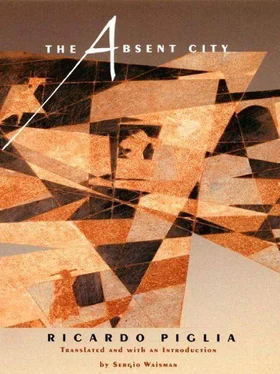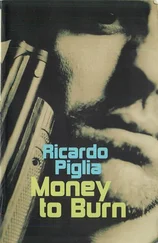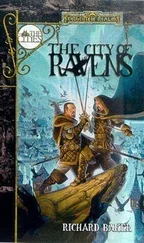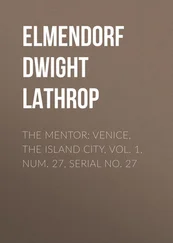With certain contemporary writers, such as Thomas Pynchon and Don DeLillo, I feel I have something in common that I refer to, somewhat in jest, as a fiction of paranoia. In a way, it derives from other readings, such as William Burroughs or Philip K. Dick, or Roberto Arlt. It is the idea of a conspiracy, which is very much present in these writers, and in The Absent City as well. The idea that society is constructed by a conspiracy, and that there is a counter-conspiracy in turn. This pulls toward a certain kind of relationship with genres, and toward a reflection of politics as intrigue. I do not mean political literature in the traditional sense, in which there is a private and a public world, with the political novel more closely linked to the public one. But rather the manner by which politics is present in literature when these two categories have dissolved — and perhaps this, then, would be the definition of the postmodern, the dissolution of the tension between the public and the private, and the dissolution of the tension between high and low culture. So that when these oppositions have dissolved, the conspiracy, the intrigue, appears as the model that the subject holds of what politics is in society.
The private subject perceives the world of politics almost like the Greeks conceived of destiny, or of their gods: as a strange manipulative movement. This is the perception that some novelists, including myself, have of the world of politics. That is, politics enters the contemporary novel through the model of a conspiracy, through the narration of an intrigue — even if this conspiracy is devoid of any explicitly political characteristics. The form itself constitutes the politicizing of the novel. The conspiracy does not necessarily have to contain elements of a political intrigue (although it may, as is the case with Norman Mailer) for the mechanism of utilizing a conspiracy to be political. It can be a conspiracy involving the delivery of mail, or a conspiracy involving Italian immigrants in Argentina, or any other invention. It is the form itself that illustrates the fictional perception of politics in our world today.
This idea, parenthetically, is already present in Borges. He was the first to use this formula, because “Tlön, Uqbar, Orbis Tertius” is based on a conspiracy, as is “Theme of the Traitor and the Hero,” and “The Garden of Forking Paths,” among others. So that Borges, with his miniaturization, was the first to speak of parallel worlds and of conspiracies as paranoid political representations of reality.
This perception of a relationship between things that are otherwise incompatible is an important aspect of contemporary fiction. A subject who obsesses deliriously with history, or a subject in delirium about a universe — or, in The Absent City, for example, subjects who experience deliriums about realities that are not as they appear to be.
Finally, I believe that the translator experiences a very strange relationship with the author of a book. The issue is not just questions associated with style, references, possible mistakes, or what kind of modifications can be established in the translation of a text. The interesting thing, rather, is the kind of work involved in translation — for it seems to be an unusual exercise in relation to reading, on the one hand, and to property, on the other. I have always been interested in the relationship that exists between translation and property, since the translator rewrites an entire text that is his/hers, and yet is not. The translator finds him/herself in a strange place, in the sense that what he/she does is transpose into another language a kind of experience that both belongs to him/her, and does not. A writer cites from another’s text, or simply copies, as we all do sometimes — because one forgets, or because one likes it too much not to do so — but the translator carries out an exercise that draws a path between both places. Translation is a strange exercise of appropriation.
I hold the same relationship with literary property as I do with property in society: I am against it. I think there is a game with property in translation. That is, it puts into question something that common literary sense takes for granted, which is the fact that issues of property in literature are extremely complex, just as they are in society. Language is a common property; in language there is no such thing as private property. We writers try to place marks to see if we can detain its flow. There is no private property in language; language is a circulation with a common flow. Literature disrupts that flow, and perhaps that is precisely what literature is.
ABOUT THE AUTHOR AND THE TRANSLATOR
Ricardo Piglia was born in Adrogué, in the Province of Buenos Aires, Argentina, in 1940. He is the author of numerous short stories, novels, and critical articles. His books of fiction include Jaulario (1967); Nombre falso (1975), translated as Assumed Name (1995); Prisión perpetua (1988); Respiración artificial (1980), translated as Artificial Respiration (1994); La ciudad ausente (1992); and Plata quemada (1997), which received the Premio Planeta.
Sergio Waisman is Assistant Professor of Spanish and Portuguese at San Diego State University. His translation of Ricardo Piglia’s Assumed Name received a Meritorious Award in the 1995 Eugene M. Kayden Translation Contest.












